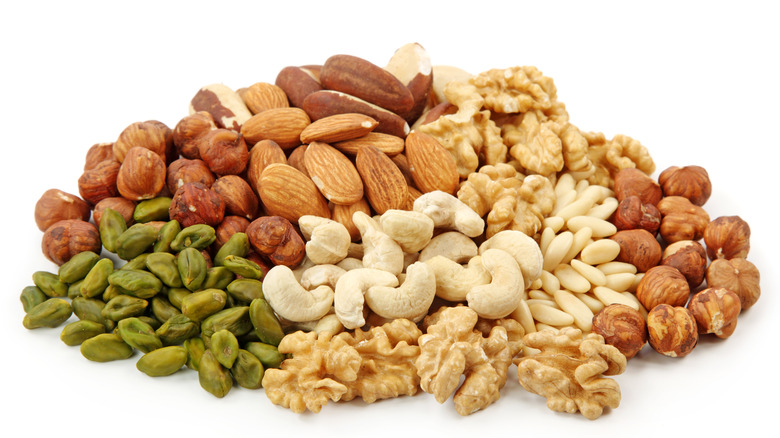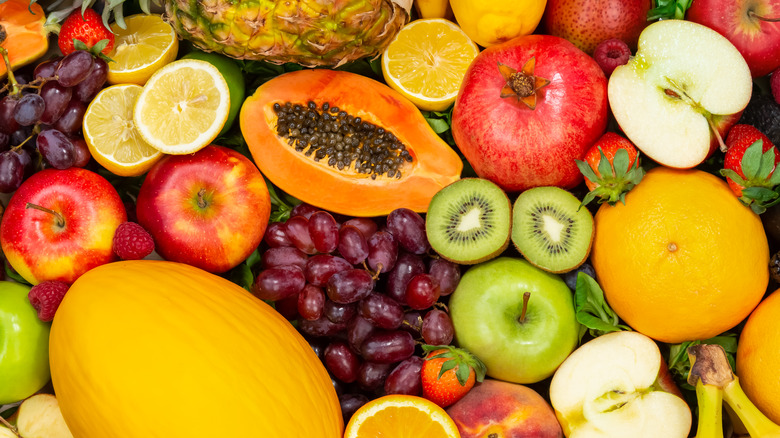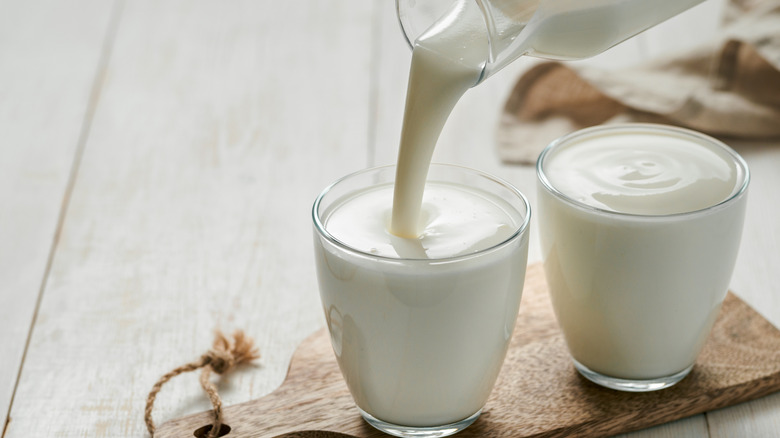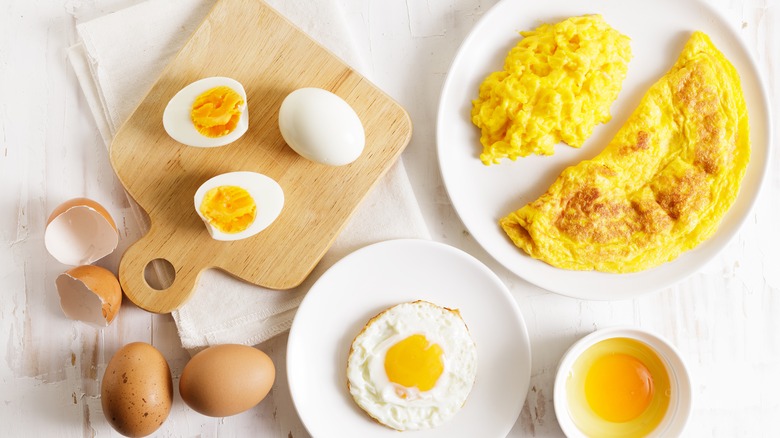The Most Nutritious Foods To Eat During Pregnancy
A healthy, whole-foods diet is always important, but especially during the childbearing year (via the Office of Disease Prevention and Health Promotion). Like most American adults, the majority of pregnant women do not consume enough nutrient-dense food, such as produce, seafood, whole grains, and dairy, while also taking in too many refined grains, added sugars, saturated fat, and salt. Balanced and nutritious food intake during pregnancy can help regulate weight gain, decrease the risks of low infant birth weight or defects, and help you avoid certain health complications. If you are pregnant, you should also avoid raw or undercooked animal products, unpasteurized foods, alcohol, and limit anything high in caffeine or mercury (via Brigham and Women's Hospital).
Your doctor or midwife can help you determine if you should have any special dietary concerns during pregnancy, and can also talk to you about how to include more nutrient-dense foods in your daily diet. These are high in vitamins and minerals while also being low in the kind of artificial sugars, sodium, or fat that can create elevated health risks (via Dietary Guidelines for Americans).
Women require around 300 extra healthy calories daily during pregnancy, according to Johns Hopkins Medicine. Focusing on what foods to include instead of zeroing in on what foods you want to restrict can be helpful and practical when making healthy changes. Let's explore some of the most nutritious foods for pregnancy. You might find some inspiration here in the beauty of the whole foods you already love!
Dark, leafy greens
On his blog Afroculinaria, Michael W. Twitty writes, "Many culinary historians agree that the green craze in the South is supported by tastes for spring greens among Celtic and Germanic Southerners but was really spearheaded by people of African descent." Greens grow year-round in Central and Western Africa, and people who were captured there and enslaved in America cooked vitamin-rich greens that have "always been staples of African American culture" (via CNN Business). Spinach, kale, dark salad greens, and chard contain vitamins A, C, E, and K, fiber, iron, calcium, magnesium, and potassium. Full of antioxidants, dark greens can provide many needed nutrients for pregnancy. Most are also high in folate, which can help support healthy DNA duplication and decrease risks of certain types of birth defects (via the Office of Disease Prevention and Health Promotion). Dark, leafy greens are low in calories and help regulate insulin and weight. Their high fiber content can also aid digestion during pregnancy. Adding greens to salads, soups, stir fry, or omelets can help you sneak servings into your daily diet. Integrating dark green veggies including spinach, arugula, kale, chard, mustard greens, collard greens, and bok choy can be an easy way for pregnant women to access more vitamins, minerals, and the folate needed to nourish fetal brain development (via Dr. Sears Wellness Institute).
Oatmeal
Oatmeal is one of the most ideal morning breakfasts for pregnant women! Don't make the mistake of skipping oatmeal. Its beta-glucans fibers regulate the absorption of carbs and can, because of this, oatmeal can help you steady blood sugar levels (via Dr. Sears Wellness Institute). According to the Harvard T.H. Chan School of Public Health, oats and oatmeal are good sources of both soluble and insoluble fiber, phosphorus, thiamine (also known as vitamin B1), magnesium, and zinc. Another important feature of oatmeal is its ability to prevent constipation and ease digestion. Beta-glucan oat fibers break down and ferment, improving gut microbiome diversity and promoting bowel movement regularity. This is particularly important during pregnancy because increased progesterone and pressure from the growing uterus can slow intestinal digestion, according to the University of Rochester Medical Center. Exercise and increased fiber and fluid intake are often recommended during pregnancy for this reason.
Seeds and nuts
Nuts are important for pregnancy since they contain essential fatty acids, which help stabilize blood pressure and aid the body in creating healthy cell membranes and synthesizing hormones, according to Lamaze International. Nuts also contain needed protein and healthy fats, according to the American College of Obstetricians and Gynecologists. Walnuts in particular are a good source of omega-3 fatty acids, which support healthy fetal brain development. According to the Dr. Sears Wellness Institute, "Nuts are one of the most nutrient-dense foods, rich in protein, healthy fats, fiber, vitamin E, calcium, and many other vitamins and minerals you and your baby need." Nuts are also easy to snack on without needing to prep, making them great for travel, or adding to your favorite baked goods, salads, or smoothie recipes. If you are prone to food allergies or have a nut allergy, be sure to discuss other options with your medical provider.
Salmon
Salmon is often considered a superfood because it can offer so many nutrients. The brilliant pink-toned fish contains omega-3 fatty acids, known to support prenatal and postpartum brain development (via the American College of Obstetricians and Gynecologists). The American College of Obstetricians and Gynecologists advises consuming at minimum two (8- to 12-ounce) servings of fish weekly during the childbearing year. Salmon is a good source of protein, which is critical to the developing fetus. Harvard University research suggests that at least 75 grams of protein daily during pregnancy can help prevent preeclampsia and low birth weights (via Midwifery Today).
Additionally, salmon is a natural source of vitamin D, which aids calcium in fetal skeletal development and supports healthy skin and eyesight. Remember, however, that the Food Safety and Inspection Service (FSIS) warns pregnant women against consuming raw fish during pregnancy, due to the dangers that Listeria or Toxoplasma bacteria pose to a fetus. Be mindful of recommended cooking temperatures and food preparation safety and hygiene.
Fruit and dried fruit
During pregnancy, the American Pregnancy Association recommends 2-3 ½ cup daily servings of fruit, such as oranges, strawberries, mangos, kiwis, or melons. Vitamin C in fruit enhances immunity, muscle, skin, and bone health (via The American College of Obstetricians and Gynecologists). A research study published in Nutrition Journal in 2017 even suggested that maternal fruit and vegetable consumption during pregnancy can support not only healthy fetal growth and development but postpartum infant growth up to 6 months. Be sure to wash raw fruits and any surfaces exposed to raw fruits before eating, to avoid any dangerous bacteria (via the Centers for Disease Control and Prevention).
Dried fruit is also a wonderful healthy snack option during pregnancy. Dried fruits can be excellent sources of needed iron, vitamins A and E, potassium, and fiber (via the New Kids Center). Also, it's wise to check for added sugars, as some dried fruit products have a high sugar content.
Chicken
Protein is required for daily repair and healing of the brain, muscles, and blood, and in pregnancy, it is required in higher amounts than usual to allow healthy fetal growth and development (via Cleveland Clinic). A variety of proteins is recommended for pregnancy. Research indicates that poultry such as chicken is healthier than red or processed meat, which is associated with disease and shortened lifespan (via the Harvard T.H. Chan School of Public Health). Chicken can be a critical source of affordable, lean protein for the body to fuel the growth of fetal tissue, breast and uterine tissue, and blood supply during pregnancy, according to the American Pregnancy Association. Around 75-100 grams of protein are needed per day during pregnancy, depending on pre-pregnancy weight and trimester.
It's important to note that the Food Safety and Inspection Service (FSIS) warns pregnant women that chicken must be fully cooked at an appropriate temperature to deter the risk of toxoplasmosis infection, which can cause fetal harm. Meats can be frozen below zero for several days to decrease infection risk. Washing cutting boards, cooking tools, and hands that may have touched raw poultry is also recommended.
Yogurt and kefir
Fermented dairy products like yogurt and kefir have some fantastic and unique benefits for pregnant women. A 2020 research review found that eating yogurt was linked to decreased pregnancy-related inflammation and infection (via Cureus). The review also showed that probiotic-filled yogurt may improve metabolic function and decrease the risk of preterm birth. Dairy products are also high in calcium, which is essential for fetal bone and tooth development, as well as maternal-infant blood, nerve, and heart function (via the American College of Obstetricians and Gynecologists). The American College of Obstetricians and Gynecologists (ACOG) suggests that pregnant women consume around 1,000 milligrams per day. According to Live Science, research shows that yogurt and kefir also contain lactobacillus acidophilus and other probiotics that may offer a range of protective risks for mother and baby. Live Science also cites a Norwegian study, based on data from around 70,000 pregnancies, which found that drinking probiotic milk products was linked to a significantly decreased incidence of preeclampsia as well as preterm delivery.
Legumes
The Leguminosae plant family, which includes legumes, beans, and peas, can offer a variety of nutrient components for pregnant people (via the Harvard T.H. Chan School of Public Health). Legumes contain vital proteins, fiber, folate, iron, phosphorus, and complex carbohydrates. They are also an affordable source of protein, which is extremely important during pregnancy. The American Pregnancy Association recommends around 2-3 half-cup servings of legumes daily during pregnancy. This can include split peas, lentils, black beans, navy beans, red or white kidney beans, black-eyed peas, or chickpeas. Legumes can also provide folic acid, which is critical for preventing birth defects, according to the Federal Drug and Food Administration (FDA). (Folic acid levels can have an impact in early pregnancy, so consuming them even before pregnancy is essential.) Folate also prevents anemia, which is important because blood volume increases during pregnancy. Legumes meet multiple nutritional needs in pregnancy — and research has even linked legume consumption to an incidence risk of low birth weights.
Eggs
Eggs are another nutrient-dense pregnancy food choice. They contain choline, which supports healthy cellular reactions and brain development. Research shows that choline deficiency during pregnancy can lead to brain development issues and neural tube defects in infants. A large 2022 study concluded that pregnant women should include eggs in their diet to support positive neurodevelopment. Once thought to be a cholesterol concern, eggs are now seen, in moderation, as a part of a heart-healthy diet, according to guidance from the American Heart Association.
Eggs are also a good source of protein, containing around 6 grams each. "Getting adequate protein can help with nausea, and a high protein diet is also useful if you want to achieve a healthy weight gain during pregnancy," says Dr. Shari Lawson, director of general obstetrics and gynecology at Johns Hopkins (via Forbes Health). Remember that eggs should be prepared and consumed with care since pregnant women are more susceptible to food-borne illness (via the Centers for Disease Control and Prevention).
Sweet potatoes
According to the American College of Gynecologists and Obstetricians, pregnancy requires 770 micrograms of vitamin A per day. Sweet potatoes are an excellent source of vitamin A. A research study published in the Journal of Nutrition, with data that included over 500 Kenyan women, also suggested that the consumption of sweet potatoes during pregnancy not only provided vitamin A during pregnancy but protected women from postpartum vitamin A deficiency. Research also shows that vitamin A is a necessary nutrient during pregnancy for healthy fetal development, most notably for ocular development, as well as the development of several fetal organs and the fetal skeleton. Vitamin A deficiency in pregnant mothers is a global public health concern, as it is the top cause of international preventable blindness. However, studies also indicate that excessive vitamin A can present particular health risks during pregnancy, including congenital malformations or miscarriage. Discuss the appropriate vitamin A intake for your diet with your medical provider.
Water
Water isn't technically a food, but it's so essential during pregnancy that it made our list. Water supplies the amniotic fluid that surrounds your baby in utero, helps vitamins and nutrients to circulate through the pregnant parent's body appropriately, and aids in digestion, according to the American College of Obstetricians and Gynecologists. Pregnant women should consume around 8 to 12 cups of water every day. This has the added benefits of preventing UTIs and hemorrhoids, working against fatigue, and cooling you down if you're warm (via What to Expect). Water is also necessary to support the amazing blood expansion that occurs during pregnancy.
"There's an expansion of blood volume during pregnancy. The average woman has about four liters of blood, and by the end of pregnancy it's expanded to about six liters," says Dr. Sharon Lawson of Johns Hopkins (via Forbes Health). That's not possible without that basic element of life, water.











